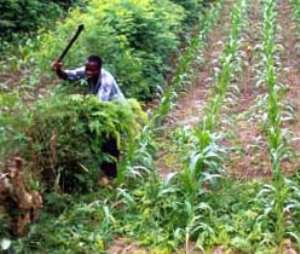
Agricultural research in Africa can receive the needed financial investment through the implementation of financial strategy in the form of research tax to boost food productivity and security, says Patrick S. Schnable, Director, Center for Plant Genomics at the Iowa State University, USA.
Research tax means putting in place a financial strategy through the tax system to raise adequate revenue to undertake various research activities in the agricultural sector.
Agricultural research is a major step to developing agricultural products which are high yielding, pests and diseases resistant, as well as drought resistant together with addressing malnutrition in Africa, Schnable emphasised.
Schnable, who said these during CropLife International Media Tour as part of the related activities of the World Food Prize in Iowa, USA (16-19, 2013) for foreign media believes that arrangement will go a long way to improve research activities in Africa.
Funding of research receives little financial support from leaders in Africa as a result researchers rely heavily on donor support to fund research activities in spite of the Maputo Declaration on Agriculture and Food Security which calls for the allocation of ten percent national budget allocation to agriculture development signed in 2010 by African leaders.
Marc Albertsen, Research Director of Trait Discovery at DuPont Pioneer, USA says leaders in Africa have to take key interest in identifying and funding research in agriculture to boost food productivity and security on the African continent.
Given the projections by the United Nations that Africa's population of 1.1 billion is expected to quadruple by 2100 and reach 4.2 billion, Albertsen emphasised the importance for African leaders to invest more in agricultural research to produce agricultural products which are resistant to drought, diseases and pests.
African researchers sometimes are not aware of philanthropic organisations which offer grants to researchers, according to Schnable, adding “collaboration among African researchers to identify philanthropic organisations that provides grants to researchers is important especially in situations where government investment is low.''
AGRA's 2013 Agricultural status report urges African countries to further invest in agricultural research and development to ensure food security amid concern that some nations are lagging behind. In terms of personnel engaged in agricultural research, Africa has the world's lowest capacity, with only 70 researchers per million inhabitants (compared with the US and Japan with 2,640 and 4,380 respectively.




 Lay KPMG audit report on SML-GRA contract before Parliament – Isaac Adongo tells...
Lay KPMG audit report on SML-GRA contract before Parliament – Isaac Adongo tells...
 Supervisor remanded for stabbing businessman with broken bottle and screwdriver
Supervisor remanded for stabbing businessman with broken bottle and screwdriver
 NDC watching EC and NPP closely on Returning Officer recruitment — Omane Boamah
NDC watching EC and NPP closely on Returning Officer recruitment — Omane Boamah
 Your decision to contest for president again is pathetic – Annoh-Dompreh blasts ...
Your decision to contest for president again is pathetic – Annoh-Dompreh blasts ...
 Election 2024: Security agencies ready to keep peace and secure the country — IG...
Election 2024: Security agencies ready to keep peace and secure the country — IG...
 People no longer place value in public basic schools; new uniforms, painting wil...
People no longer place value in public basic schools; new uniforms, painting wil...
 'Comedian' Paul Adom Otchere needs help – Sulemana Braimah
'Comedian' Paul Adom Otchere needs help – Sulemana Braimah
 Ejisu by-election: Only 33% of voters can be swayed by inducement — Global InfoA...
Ejisu by-election: Only 33% of voters can be swayed by inducement — Global InfoA...
 Minority will expose the beneficial owners of SML, recover funds paid to company...
Minority will expose the beneficial owners of SML, recover funds paid to company...
 Prof. Opoku-Agyemang has ‘decapitated’ the NPP’s strategies; don’t take them ser...
Prof. Opoku-Agyemang has ‘decapitated’ the NPP’s strategies; don’t take them ser...
